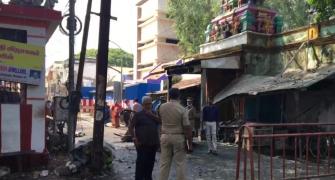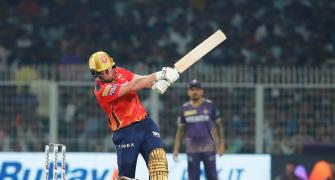In a city known for gambling and prize fights, Democratic Presidential candidates Barak Obama and John Edwards gambled that the ploy of targetting Hillary Clinton, which paid good dividends in the previous debate on October 30, would continue to yield dividends. They lost.
Hillary Clinton gambled that the rope-a-dope tactics she had employed during the previous debate, where she allowed her two leading rivals to punch away at her while she hung on and absorbed it all, needed to be replaced; she gambled that she had to punch back. She did, and she won.
With CNN anchor Wolf Blitzer playing a largely ineffective host, the debate at the University of Nevada's Cox Pavilion featuring the top seven Democratic candidates kicked off with Obama and Richards launching attacks on Clinton. Obama was first off the mark, accusing Clinton of not giving a straight answer on tough questions such as social security and official ids for illegal immigrants. Edwards for his part brought up Clinton's 'aye' vote on the Iraq war.
Clinton, who for two days before the debate had eschewed most engagements and spent time in debate prep, signaled that she was in combative mood right at the outset, when she laughingly said, 'This pants suit, it is asbestos tonight.'
Eschewing the polite non-sequiturs that had characterised her October 30 performance, Clinton then set out to fight her fire with fire. Obama, Clinton pointed out, had avoided voting on universal health care, one of the burning topics in the lead up to the presidential race. Rounding on Edwards, she said she had no problem with her voting record being questioned, but accused her rival of trading in the sort of attacks that were straight out of the Republican playbook.
The first sign that the tactic of targeting Clinton was not working came when the audience collectively groaned in response to Edwards' attacking his opponent on her links with various Washington lobbyists. And when Senator Joe Biden, another of the Democratic candidates, used his turn at mike to ignore the slug fest between the three leading rivals and make his own case for the nomination, the applause clearly signaled that the audience was in a mood to listen to a reasoned debate, as against personal attacks.
The failure of tactics that had worked well for them on October 30 clearly flustered Obama and Edwards; the former was ineffective for the first half of the debate, while the latter managed to stay on message, but was a far cry from his effective performance in the previous debate.
Obama got tangled up in an involved explanation of his stand on universal health care; Clinton promptly lashed out, pointing out that her rival's proposals would leave 15 million Americans with no viable healthcare.
The slugfest between Obama, Edwards and Clinton dominated proceedings for the first 20 minutes; when the crowd (sections of the media have suggested that this was the work of people planted by the Clinton campaign) repeatedly booed Edwards in particular for repeating his attacks, he and Obama were finally forced to change tack.
The debate then cycled to issues that have come up in previous encounters between the Democratic field: the situation in Pakistan and in Iraq; the questions of universal health care and of illegal immigration; the problems of nuclear waste and of various trade agreements that under the George W Bush presidency have become bones of contention being chief among them.
The steam, however, seemed to have gone out of the debate following the opening exchanges; the candidates in turn cycled through their previously announced positions and, barring the occasional barbs and one-liners, added little to the ongoing debate on the various issues.
Consensus among media analysts was that the Las Vegas debate would go down as a plus in the Hillary Clinton column, a no-score for Edwards, and a definite minus for Obama who largely failed to show at his best.
The debate and its outcome is significant not so much from the point of view of the views articulated, but in terms of the build up to the crucial Iowa primary of January 3. Clinton had clearly been the loser in the October 30 debate; by holding her own here, and turning the heat back on the rivals, she recaptured the edge that makes her the front-runner in all national polls.
The CNN opinion poll following the debate suggested that Hillary Clinton had won it outright. Interestingly, however, a KCCI-TV survey, in Iowa, on the day of the debate indicated that in the race for the first of the primaries, Clinton, Edwards and Obama are tied, with a sizeable chunk (11 per cent) of the voters in Iowa undecided on which candidate to back.





